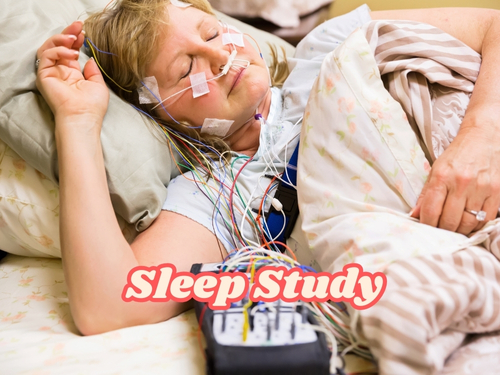What is a Sleep Study?
A sleep study is a test that monitors your sleep patterns overnight or during a series of naps throughout the day. These tests help diagnose sleep disorders such as insomnia, obstructive sleep apnea (OSA), and narcolepsy. Conducted in a specialized sleep center or at home, sleep studies provide crucial insights into sleep-related health problems.
Why Do You Need a Sleep Study?
If your healthcare provider suspects a sleep disorder, they may refer you for a sleep study to determine the best treatment options. Sleep studies help identify sleep-related conditions that may be affecting your overall health and quality of life.
Common Signs of Sleep Disorders
You may need a sleep study if you experience:
- Loud snoring during sleep
- Pauses in breathing while asleep
- Restless or disrupted sleep
- Excessive daytime sleepiness
Conditions such as obstructive sleep apnea (characterized by pauses in breathing due to a blocked airway) and narcolepsy (excessive daytime sleepiness with sudden sleep episodes) require accurate diagnosis and treatment.
Types of Sleep Studies
Sleep evaluations can be conducted at home or in a specialized sleep center, depending on the severity of symptoms. The different types of sleep studies include:
Overnight Sleep Studies (Nocturnal Studies)
Home Sleep Testing (HST)
- Conducted in the comfort of your home.
- Measures breathing rate, airflow, heart rate, and oxygen levels.
- A technician will guide you on using the equipment, but no technician is present during the test.
Full Polysomnography (PSG)
- Performed in a sleep laboratory under medical supervision.
- Monitors breathing, heart rate, brain activity, body movements, and eye movement.
- A sleep technician observes and records data throughout the night.
Continuous Positive Airway Pressure (CPAP) Trial
- Evaluates how well you sleep while using a CPAP machine, which helps treat obstructive sleep apnea.
- CPAP delivers pressurized air through a mask to keep your airway open.
- Conducted in a sleep lab with a technician adjusting settings as needed.
Split-Night Study
- A combination of polysomnography and a CPAP trial.
- The first half of the night assesses whether sleep apnea is present.
- If diagnosed, CPAP therapy is introduced in the second half of the night to determine its effectiveness.
Daytime Sleep Studies
Multiple Sleep Latency Test (MSLT)
- Determines how quickly you fall asleep during the day.
- Used primarily to diagnose narcolepsy and excessive daytime sleepiness.
Maintenance of Wakefulness Test (MWT)
- Assesses your ability to stay awake in situations that promote sleepiness.
- Helps evaluate conditions affecting daytime alertness.
What to Expect During a Sleep Study
If you are undergoing a sleep study in a sleep lab:
- A technician will set up small electrodes on your head and body (no needles involved).
- The study will monitor brain activity, breathing patterns, heart rate, oxygen levels, snoring, and muscle movements.
- If a CPAP trial is needed, the technician will help fit a mask for optimal comfort.
- You can relax before bedtime, and the technician will monitor your sleep throughout the night.
For at-home sleep studies:
- You will be given portable equipment and instructions on how to use it.
- Data collected will be analyzed by a sleep specialist to determine your diagnosis.
How to Prepare for a Sleep Study
To ensure accurate results, follow these guidelines:
- Eat your regularly scheduled meals on the day of your study.
- Avoid alcohol, caffeine, and chocolate for at least 24 hours before the study.
- Ask your healthcare provider whether to pause any medications before the test.
- Go to sleep at your normal bedtime the night before the study.
- Do not take naps on the day of the sleep study.
- Shower and wash your hair before the test, avoiding lotions, makeup, perfume, cologne, or hair products that may interfere with electrode placement.
What Happens After a Sleep Study?
- A sleep specialist will analyze your results and provide a diagnosis.
- Your healthcare provider will discuss treatment options if a sleep disorder is detected.
- If CPAP therapy is recommended, a provider will guide you through setup and use.
- Additional tests may be scheduled if needed.
Final Thoughts
Sleep studies play a critical role in diagnosing and treating sleep disorders, improving overall health and well-being. If you experience sleep-related symptoms, consult your healthcare provider for further evaluation.
About Us
At RSDC we have a particular interest in quick approach and triaging patients with suspected lung malignancy, management of pleural diseases, sleep disorders of obstructive sleep apnoea and other more complex sleep disorders, airways disease including asthma and COPD.
We use a comprehensive approach to interstitial lung disease in addition to occupational and environmental lung disease.

